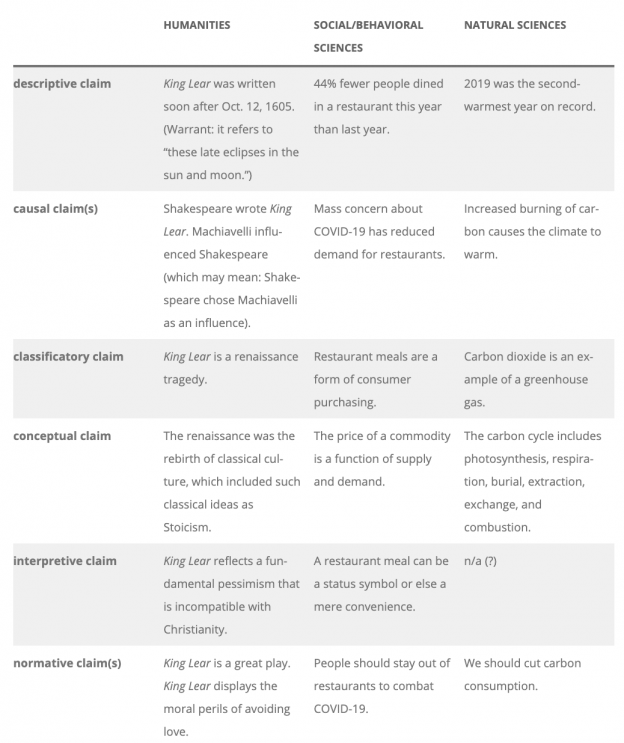- Facebook74
- Twitter1
- Total 75
Any serious (non-fiction) thinker makes claims, supports them with warrants, expects each claim to be challenged, and will withdraw a claim if the challenge proves valid.
However, people make many types of claims, with many kinds of warrant.
Here is a chart that suggests six different kinds of claim (descriptive, causal, conceptual, classificatory, interpretive, and normative) with examples of how a humanist, a social or behavioral scientist, and a natural scientist might make each of them.
| humanities | Social/Behavioral Sciences | Natural Sciences | |
|---|---|---|---|
| descriptive claim | King Lear was written soon after Oct. 12, 1605. (Warrant: it refers to “these late eclipses in the sun and moon.”) | 44% fewer people dined in a restaurant this year than last year. | 2019 was the second-warmest year on record. |
| causal claim(s) | Shakespeare wrote King Lear. Machiavelli influenced Shakespeare (which may mean: Shakespeare chose Machiavelli as an influence). | Mass concern about COVID-19 has reduced demand for restaurants. | Increased burning of carbon causes the climate to warm. |
| classificatory claim | King Lear is a renaissance tragedy. | Restaurant meals are a form of consumer purchasing. | Carbon dioxide is an example of a greenhouse gas. |
| conceptual claim | The renaissance was the rebirth of classical culture, which included such classical ideas as Stoicism. | The price of a commodity is a function of supply and demand. | The carbon cycle includes photosynthesis, respiration, burial, extraction, exchange, and combustion. |
| interpretive claim | King Lear reflects a fundamental pessimism that is incompatible with Christianity. | A restaurant meal can be a status symbol or else a mere convenience. | n/a (?) |
| normative claim(s) | King Lear is a great play. King Lear displays the moral perils of avoiding love. | People should stay out of restaurants to combat COVID-19. | We should cut carbon consumption. |
Every one of these claims (including the normative ones) is testable and falsifiable. Each one requires some kind of reason–but not the same kind of reason.
Each kind of researcher or scholar makes more than one kind of claim. It is not true that natural scientists rely exclusively on experiments and are only interested in causal claims. They also describe, classify, and build conceptual models.
It is not clear, however, that natural scientists truly make interpretive claims. They certainly interpret data, but I think their interpretations are actually descriptive, causal, conceptual, or classificatory claims. In the humanities, “interpretation” means understanding the subjective meaning of an action for the actors, and that is not possible for most of the natural world–excepting people and perhaps some other animals. In a phrase like “the Copenhagen interpretation of quantum mechanics,” I don’t think that the word “interpretation” means what it does for a scholar of human beings. It’s more like a model.
It is also not clear that science–natural or social–provides reasons for normative claims. It is true that we should cut carbon consumption, but not directly because of what science finds. Science describes and explains the situation; to decide that we should do something requires a different kind of reason.
People can provide good normative reasons (or bad ones, which can be rejected), but these reasons do not arise from science. That is why scientists often claim to be value-neutral. In contrast, humanists’ claims often have strong normative implications. To explain, classify, describe, conceptualize, or interpret a human action often provides the grounds for judging it.
See also: navigating the disciplines; what the humanities contribute to interdisciplinary research projects; what are the humanities? (basic points for non-humanists); what does a Balinese cockfight have to do with public policy analysis?; notes on the social role of science: 1. the example of fetal ultrasounds.
